|
|
|
Sort Order |
|
|
|
Items / Page
|
|
|
|
|
|
|
| Srl | Item |
| 1 |
ID:
105354
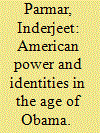

|
|
|
|
|
| Publication |
2011.
|
| Summary/Abstract |
Although the election of Barack Obama to the US presidency represents a landmark event in the history of that country, questions remain over its broader political significance. What is the likelihood of Obama's foreign and national security policies differing fundamentally from those of the Bush administrations? Does Obama's election signal a 'post-racial' phase in American national life? What are the factors that suggest opportunities to change and expand American identities as opposed to those that limit Obama's sphere of action? This article introduces the special issue and suggests that although Obama's room for manoeuvre is limited by legacies inherited from the Bush administration, Obama's own appointments to high office as well as other actions, despite the availability of alternative courses, indicate that he is not the transformational president he claimed to be. American identities, therefore, are deeply embedded and remain heavily imbued with racial, religious and imperial features.
|
|
|
|
|
|
|
|
|
|
|
|
|
|
|
|
| 2 |
ID:
086400
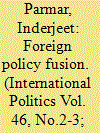

|
|
|
|
|
| Publication |
2009.
|
| Summary/Abstract |
Several tendencies in US foreign policy politics generated a new foreign policy consensus set to outlast the Bush administration. Three developments are analysed: increasing influence of conservative organizations - such as the Heritage Foundation, and of neoconservatism; and, particularly, democratic peace theory-inspired liberal interventionism. 9-11 fused those three developments, though each tendency retained its 'sphere of action': Right and Left appear to have forged an historically effective ideology of global intervention, an enduring new configuration of power. This paper analyses a key liberal interventionists' initiative - the Princeton Project on National Security - that sits at the heart of thinking among centrists, liberal and conservative alike. This paper also assesses the efficacy of the new consensus by exploring the foreign policy positions and advisers of President-elect Barack Obama and his defeated Republican rival, Senator John McCain, concluding that the new president is unlikely significantly to change US foreign policy.
|
|
|
|
|
|
|
|
|
|
|
|
|
|
|
|
| 3 |
ID:
159463
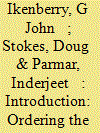

|
|
|
|
|
| Summary/Abstract |
The Trump presidency appears to personify, along with Britain's vote to withdraw from the European Union, a sense of deep crisis in the United States-led liberal international order (LIO). The two states that conceived and constructed a whole array of international institutions after 1945 now seem to be rejecting that order, or at the very least, demanding that its institutions either be reformed or recalibrated to better suit their purposes. However, both developments may signal a new phase in the evolution of the international system—more nationalistic, state-centric and transactional, in which costs and responsibilities are more widely shared and where the electorate questions the costs versus benefits of the postwar liberal consensus. This crisis has long been evident
|
|
|
|
|
|
|
|
|
|
|
|
|
|
|
|
| 4 |
ID:
093298
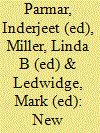

|
|
|
|
|
| Publication |
London, Routledge, 2009.
|
| Description |
xiii, 277p.
|
| Standard Number |
9780415777483
|
|
|
|
|
|
|
|
|
|
|
|
Copies: C:1/I:0,R:0,Q:0
Circulation
| Accession# | Call# | Current Location | Status | Policy | Location |
| 054716 | 327.73/PAR 054716 | Main | On Shelf | General | |
|
|
|
|
| 5 |
ID:
098293
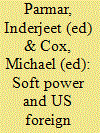

|
|
|
|
|
| Publication |
London, Routledge, 2010.
|
| Description |
x, 236p.
|
| Series |
Routledge studies in US foreign policy
|
| Standard Number |
9780415492034, hbk
|
|
|
|
|
|
|
|
|
|
|
|
Copies: C:1/I:0,R:0,Q:0
Circulation
| Accession# | Call# | Current Location | Status | Policy | Location |
| 055178 | 327.73/PAR 055178 | Main | On Shelf | General | |
|
|
|
|
| 6 |
ID:
052776


|
|
|
|
|
| Publication |
Hampshire, Palgrave Macmillan, 2004.
|
| Description |
vii, 267p.Hbk
|
| Standard Number |
1403921032
|
|
|
|
|
|
|
|
|
|
|
|
Copies: C:1/I:0,R:0,Q:0
Circulation
| Accession# | Call# | Current Location | Status | Policy | Location |
| 048378 | 940.532241/PAR 048378 | Main | On Shelf | General | |
|
|
|
|
| 7 |
ID:
168924
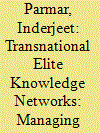

|
|
|
|
|
| Summary/Abstract |
The liberal international order’s own theory is as much in crisis as the institutional system whose virtues it champions. This is due first to theoretical shortcomings per se, and due second to its misunderstanding or neglect of the role of elite knowledge networks and of socialization in the development and perpetuation of American liberal hegemony. This article, which adds to recent interest in the dynamics of hegemonic-order building and maintenance, argues that a neo–Gramscian-Kautskyian theoretical synthesis better explains the character and methods of the liberal international order. The article considers two cases through which to compare liberal-internationalist and Gramscian-Kautskyian claims: the 1970s challenge of third-world states under the banner of a new international economic order (NIEO) and the managed opening of China, and the Trumpian challenge to the liberal international order. On that basis, the article concludes that the hegemonic liberal international order and its core states and elite networks are engaged in a titanic struggle against forces unleashed by a combination of its own successes, inadequacies, and exclusions. Gramscian-Kautskyian theory, using the transnationally extended “elite knowledge network” concept, also suggests that, despite turbulence, the hegemonic liberal international order has significant powers of adaptation, co-optation, and resistance, and is likely to remain resilient, if turbulent and not unchanged, for the foreseeable future.
|
|
|
|
|
|
|
|
|
|
|
|
|
|
|
|
| 8 |
ID:
159471


|
|
|
|
|
| Summary/Abstract |
This article argues that the biggest challenges facing the post-1945 liberal international order are the need to genuinely embrace ethno-racial diversity and to reduce class-based inequalities. However, this is problematic because the liberal international order's core foundational principles, and principal underpinning ‘theory’ (liberal internationalism), are Eurocentric, elitist and resistant to change. Those core principles are subliminally racialized, elitist and imperial. They are embedded in post-1945 international institutions, elite mindsets, and in the institutions of the US foreign policy establishment—which are seeking to incorporate emerging power elites, willingly, into the US-led order. As illustration, this article considers examples that bookend the US-led system: wartime elite planning for global leadership; the role of the United Nations in Korea from 1945 to 1953, where it served as the primary instrument for the creation and incorporation of (South) Korea into the US-led order; and several US state-linked initiatives in China over the past several decades, including the Ford Foundation. The article compares the contemporary and historical evidence to liberal internationalist claims, as well as to claims implied by work on ‘ultra-imperialism’, based on Karl Kautsky's and Antonio Gramsci's ideas of hegemony. The article concludes that elite incorporation—by a combination of coercion, attraction and socialization—is the principal goal of the US-led order, as opposed to embracing diversity and moving towards genuine change felt at a mass level. Hence, we should expect domestic and international political crises to deepen.
|
|
|
|
|
|
|
|
|
|
|
|
|
|
|
|
|
|
|
|
|